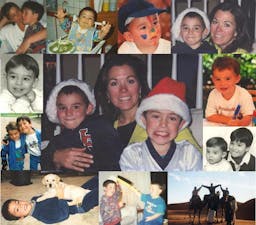WOMEN’S RIGHTS - Cross-Cultural Marriages - 2006
Jan 21, 2015
Story
Generalizations and conclusions about cross-cultural marriages are difficult because the combinations cover such a wide range of possibilities. However, if I had to identify my marriages biggest cross-cultural challenge I would say it was due to my husband’s and my differences in definition of gender roles and women’s rights. And, unfortunately my husband is deep into the “macho” zone on the spectrum, and I am deep into the “feminist” zone, but I think that this “war of the sexes” is being waged all over the world; some in more peaceful, and some in more hostile zones than my own.
There are two other factors that complicate our situation, however. First, my husband is culturally Spanish with a bit of French while I am culturally American, and second our marriage developed in various different countries and against different cultural backdrops. For example, the “stance” of women’s rights in the host country had an large effect on what was “correct” behavior for my husband, his Spanish “macho-ism” is decidedly more apparent when we are in Spain than other countries, or even when we are amongst Spaniards in other countries.
Both of his grandfathers fought on the losing side of the Spanish Civil War; one an anarchist, the other a communists, and both ended up in Morocco where my husband grew up. When he was 12 they moved to France where he lived until 1990, when we first started moving around. His family is definitely what one would consider “left” on the political side in Spain and “traditional” in terms of women’s rights and roles.
On the other hand, I am from a conservative, upper-middle class, American background with many of the same basic beliefs as my husband about women’s roles, but not rights. My husband and I have the same perception of what my tasks and responsibilities are, however, he sees the wife and mother as someone who exists exclusively to serve her family, and I see her more as a guide or manager. And, the difference in my husband’s and my education are aggravated by our cultural reference of what is appropriate not only in terms of what my role is, but also in what his role is.
Women’s rights have advanced enormously in Spain since the death of Franco, however, they are still far behind northern Europe, the US and Canada. Therefore, what is culturally “normal” in Spain is not necessarily so for me, as a liberal (and perhaps terribly liberal) American. For example, I constantly hear men saying “callate tonta!” (shut-up stupid) to their wives; personally I find it offensive, but the Spanish attitude is “oh, it doesn’t mean anything, it’s just an expression.” Or worse the example of “joder, coño….” (I am trying to keep profanity out of this website, but can I swear in Spanish in an English text, and remain politically correct?)
Normally, Mediterranean, vociferous, large extended families are portrayed as ultimately loving, caring families, but after many years of living in the middle of such turmoil, I would rephrase and call them “warm and welcoming,” but not loving. Because, if you really listen to the dialogue of all the shouting, it’s a non-stop barrage of insults and provocations designed to establish the “pecking order” within. But what offends me the most, is that this vulgarity becomes and integral part of life and children are brought up in a dialogue of total disrespect for themselves and others. Unfortunately, I fear that what I have observed in “mi familia politica,” is all to often the case in “matriarch/patriarch, power-struggle” families, whether they be Christian, Jewish, Muslim, or atheist, and this environment teaches and perpetuates egotistical “survival of the fittest” techniques and not self-fulfillment or self-actualization ones.
And, herein lies the problem as I re-read the last paragraph; for me, their shouts and insults resemble a war zone, but for them it is normality!
Unfortunately, for those of us who marry products of this environment, and find ourselves with totally egotistical husband (I assume that I am not alone,) living in the hope that we may somehow change them into loving-caring human beings; beauty and the beast type deal! Unfortunately, I fear that our efforts are in vain.
My marriage counselor’s advice was “Los hombres son como piedras, no se pueden romper, pero con tiempo se pueden pulir, como las olas del mar.” (Men are like stone, they are hard to be broken, but over time can be polished as with the waves of the sea) my response was “that sounds like becoming a nag, and I don’t want to become a nag.” (the advice was as Latino as my response was American.) Culturally, for him things “take time,” especially change (and expressed in a very romantic way,) and for me the more practical side prevailed. My conclusion after all of these years is that we cannot change these men.
Or, maybe I shouldn’t have chosen a macho-male, marriage counselor. “¿No?”
I guess the best advice I could give after many years in a cross-cultural marriage is the same as for any marriage; if there is not a respect for the other’s cultural traditions and beliefs, and respect for ones partner as a person and as an equal, friction and havoc are bound to prevail.
In writing this article, I have attempted to share my personal challenges, however, I hope that those of you who have been or are married to someone of another culture will share your thoughts and experiences here.
by Quenby Wilcox – Fall 2006




